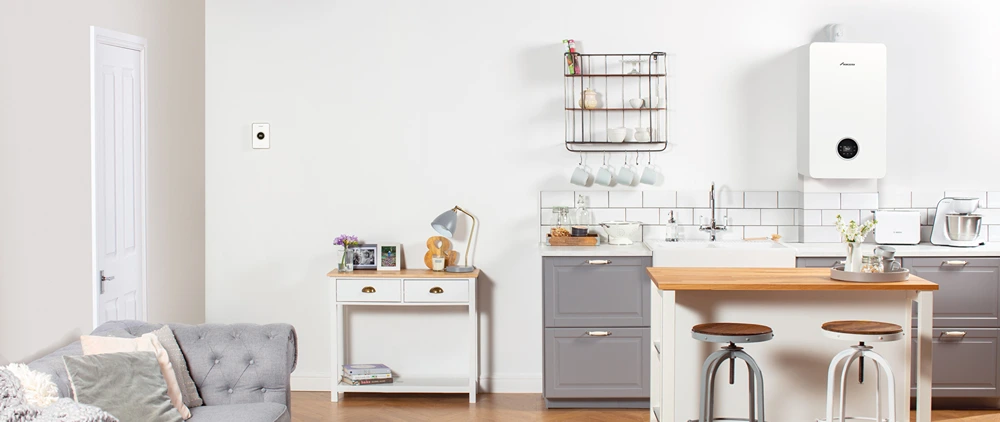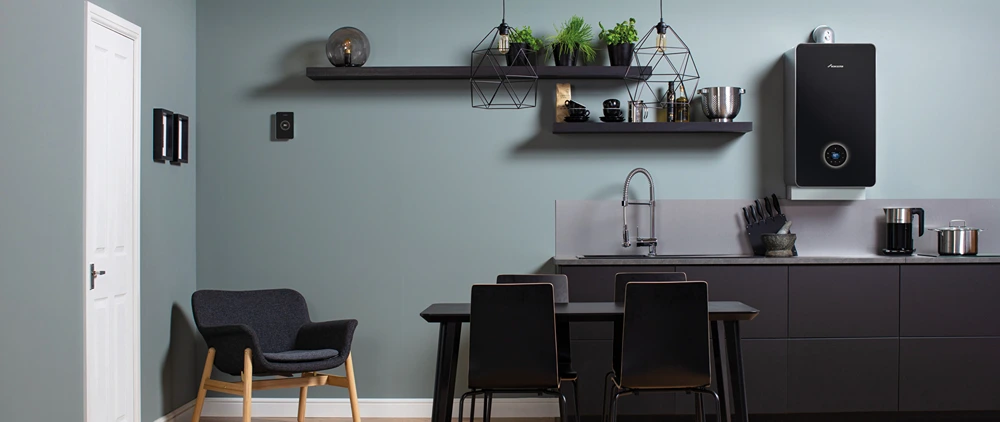Are you lost in the maze of boiler options, unsure which one is best for your home? Choosing the right boiler is crucial for ensuring comfort, reducing energy bills, and minimising your environmental impact. In this guide, HeatCo Scotland Ltd. explains the main types of boilers—Combi, System, and Conventional—so you can make an informed decision. Whether you have a small flat or a spacious family home, understanding the pros and cons of each boiler type will help you pick the perfect fit.

Types of Boilers: Combi, System, and Conventional
Understanding the different types of boilers is crucial. Each type of boiler offers unique advantages and is suited to different home sizes and heating needs. By familiarizing yourself with the various options, you can make an informed decision that aligns with your home’s requirements and your personal preferences. Whether you opt for a combi, system, or conventional boiler, understanding their differences will guide you to the best choice for your household. when selecting the right one for your home. Each type has specific characteristics that make it suitable for various home sizes and needs.
Combi Boilers
Combi boilers, or combination boilers, are particularly well-suited for smaller homes with one or two bathrooms. They operate by heating water on demand, which reduces heat loss and enhances energy efficiency. One of the primary requirements for installing a combi boiler is good water pressure, as this type of boiler does not store hot water but heats it directly from the mains. This makes combi boilers both space-saving and efficient, eliminating the need for a separate hot water cylinder or cold water storage tank.
System Boilers
System boilers are ideal for medium-sized homes with multiple bathrooms. Unlike combi boilers, system boilers can deliver hot water to several taps simultaneously without a drop in pressure. They require a hot water cylinder, usually housed in an airing cupboard, but do not need a cold water storage tank. This makes system boilers a good middle-ground option, providing both efficiency and the capacity to meet higher hot water demands.
Conventional Boilers
Conventional boilers, also known as regular or heat-only boilers, are best suited for larger homes with multiple bathrooms. These boilers need both a cold water storage tank in the loft and a hot water cylinder in a cupboard. The primary advantage of conventional boilers is their ability to supply hot water to multiple outlets simultaneously, making them ideal for homes where high water demand is a daily requirement. However, the need for additional space to house the tanks and cylinders can be a drawback.
| Boiler Type | Suitability | Key Features |
|---|---|---|
| Combi Boiler | Smaller Homes | Heats water on demand, requires good water pressure, space-saving |
| System Boiler | Medium-Sized Homes | Delivers hot water to multiple taps, requires hot water cylinder |
| Conventional Boiler | Larger Homes | Supplies multiple hot water outlets, requires cold water tank and hot water cylinder |
Factors to Consider When Choosing a Boiler
Selecting the right boiler for your home is essential to ensure comfort, efficiency, and cost-effectiveness. Several factors must be evaluated to make the best choice, including the size of your home, the number of bathrooms, available space for installation, water pressure, and your specific hot water needs.
Home Size and Hot Water Needs
The size of your home and the number of bathrooms play a crucial role in determining the appropriate boiler size. For smaller homes with one or two bathrooms, a combi boiler might be the best option due to its compact size and efficiency in heating water on demand. For medium-sized homes with multiple bathrooms, system boilers are more suitable as they can deliver hot water to several taps simultaneously. Larger homes with multiple bathrooms and higher hot water demands may require a conventional boiler, which can supply hot water to multiple outlets at the same time.

Boiler Efficiency Ratings
Efficiency ratings are paramount when choosing a boiler. High-efficiency boilers can significantly reduce energy bills and environmental impact. Boilers are rated on their ability to convert fuel into heat, and opting for a boiler with an A-rating or above ensures optimal performance. Modern boilers are designed to maximise energy use, and selecting one with a high efficiency rating can lead to substantial savings over time.
Fuel Type
The type of fuel used by the boiler is another critical factor. The most common fuel options include natural gas, LPG (liquefied petroleum gas), oil, and electricity. Natural gas is often the preferred choice due to its cost-effectiveness and availability. LPG and oil are alternatives, especially in areas where natural gas is not accessible, but they may involve higher running costs. Electric boilers are an option for homes without access to gas or oil but tend to be more expensive to operate.
Available Space for Installation
The space available for installing the boiler is another essential consideration. Combi boilers are compact and ideal for homes with limited space, as they do not require a separate hot water cylinder or cold water storage tank. System boilers need space for a hot water cylinder, typically in an airing cupboard, while conventional boilers require both a hot water cylinder and a cold water tank, necessitating additional space.
- Home size and number of bathrooms
- Efficiency ratings
- Fuel type
- Installation space
- Water pressure
Cost Considerations for Boiler Installation
Understanding the costs associated with boiler installation is crucial to ensure you make an informed decision that balances your budget and heating needs. Costs can vary significantly depending on the type of boiler, the complexity of the installation, and long-term operational efficiencies.
Initial Costs
The initial cost of a new boiler is one of the primary considerations. Combi boilers are generally more budget-friendly, often costing less than their system and conventional counterparts. The price of a new boiler can range from a few hundred to several thousand pounds, depending on the brand and model. It’s essential to factor in the upfront purchase cost to avoid overspending.
Installation Costs
Installation costs can vary widely. The process of boiler installation is a critical phase that requires careful planning and execution. Understanding the duration and complexity of the installation can help you prepare adequately and manage expectations. Whether you’re upgrading to a more efficient model or installing a boiler for the first time, knowing what to expect can make the process smoother and more efficient., typically ranging from £500 to £1,500. The complexity of the installation plays a significant role in determining the final price. For instance, replacing an old boiler with a new one of the same type is generally less costly. Replacing an old boiler can be a daunting task, but it often brings about significant improvements in efficiency and reliability. When you replace your old boiler, you not only enhance your home’s heating capabilities but also potentially reduce your energy bills. The new models are designed to be more efficient, which means they use less fuel to produce the same amount of heat, making them a wise investment for the future. than converting from a conventional to a combi boiler, which may require additional plumbing and electrical work. Ensuring a smooth boiler replacement process is essential for minimizing disruptions and ensuring that your new system functions optimally from day one. By planning ahead and consulting with professionals, you can navigate the complexities of boiler replacement with ease, ensuring that your home remains warm and comfortable throughout the transition. It’s advisable to obtain multiple quotes from certified installers to get a comprehensive view of the potential costs.
Long-term Savings and Maintenance
Energy-efficient boilers can lead to substantial long-term savings on your energy bills. High-efficiency models consume less fuel, which translates into lower monthly expenses. Additionally, it’s important to consider the maintenance costs associated with the boiler. Regular servicing is necessary to ensure optimal performance and longevity. While maintenance adds to the overall cost, neglecting it can result in higher repair expenses down the line. Opting for a boiler replacement can offer numerous benefits, including improved energy efficiency and reduced maintenance costs. Newer models are designed to be more reliable and efficient, which can lead to significant savings on energy bills over time. By investing in a replacement, you ensure that your home heating system is up-to-date and capable of meeting your household’s demands.
- Initial Boiler Cost
- Installation Cost
- Long-term Energy Savings
- Maintenance Costs
Efficiency and Environmental Impact of Different Boilers
Efficiency is a critical factor when choosing a boiler for your home. High-efficiency boilers not only reduce energy bills but also minimise environmental impact. Boilers are rated based on their ability to convert fuel into heat, and modern high-efficiency models are designed to maximise this conversion. Opting for a boiler with an A-rating or higher ensures optimal performance, translating into significant savings over time and a smaller carbon footprint.
Different types of boilers vary in their efficiency and environmental impact. Combi boilers, for instance, are known for their on-demand heating capabilities, which eliminates heat loss associated with storing hot water. System boilers, while slightly less efficient due to the need for a hot water cylinder, still maintain high-efficiency ratings and can service multiple outlets simultaneously. Conventional boilers, though generally less efficient due to the need for both a hot water cylinder and a cold water tank, can still be a viable option for larger homes with high hot water demands. Choosing a boiler that uses an eco-friendly fuel type. Boiler upgrades enhance home comfort by providing more consistent heating and improved efficiency. Upgrading your boiler can transform your living environment, making it more comfortable and reducing your carbon footprint. Modern boilers are equipped with advanced features that allow for better temperature control and energy management, ensuring that your home remains cozy while also being environmentally conscious., such as natural gas or electricity, can further reduce your home’s environmental footprint.
- High-Efficiency Ratings
- Energy Bill Savings
- Reduced Environmental Footprint
- Types of Fuel and Their Impact

Expert Recommendations for Choosing the Right Boiler
When selecting a boiler for your home, expert advice is invaluable. Consulting a Heating Engineer or a Gas Safe Plumber ensures you receive tailored advice specific to your property’s requirements. These professionals can accurately assess your home’s heating and hot water needs, taking into account factors such as home size, water pressure, and individual preferences, to recommend the most suitable boiler.
Experts generally recommend evaluating several key criteria before making a decision. Home size is crucial; a larger home with multiple bathrooms may require a system or conventional boiler, while a smaller home could suffice with a combi boiler. Water pressure is another vital consideration, especially for combi boilers that need good mains pressure to function effectively. Tailoring the boiler choice to your specific needs, such as hot water demand and installation space, ensures optimal performance and efficiency.
- Consult a Heating Engineer or Gas Safe Plumber
- Consider Home Size and Water Pressure
- Tailor Choice to Specific Needs
FAQs and Buyer’s Checklist
When choosing the right boiler for your home, it’s essential to address common questions that potential buyers often have. What size combi boiler is best for my house? The size of the combi boiler largely depends on the number of bathrooms and the overall hot water demand. Generally, a combi boiler suitable for a small house with one or two bathrooms would have an output of 24-27 kW. What is a combi boiler? A combi boiler, or combination boiler, is a highly efficient unit that provides both heating and hot water directly from the mains, without the need for a hot water cylinder or cold water tank.
To assist in selecting the right boiler, a buyer’s checklist is invaluable. The checklist should include several critical factors to consider. Assess home size and hot water needs to ensure the boiler can meet your household’s requirements without overburdening the system. Check efficiency ratings to find a boiler with high energy efficiency, which will save on energy bills and reduce environmental impact. Determine the suitable fuel type, whether it be natural gas, LPG, oil, or electricity, based on availability and cost-effectiveness. Compare costs, including initial purchase, installation, and long-term operational expenses. Lastly, seek professional advice from a Heating Engineer or Gas Safe Plumber to make an informed decision.
- Assess Home Size and Hot Water Needs
- Check Efficiency Ratings
- Determine Suitable Fuel Type
- Compare Costs
- Seek Professional Advice
Final Words
Understanding the different types of boilers—combi, system, and conventional—helps in selecting the best option for your home.
Considering factors like home size, efficiency, fuel type, and installation space ensures you choose the right boiler. Cost considerations are equally crucial for budgeting, including initial and long-term expenses.
Efficiency and environmental impact highlight the importance of high-efficiency models. Expert recommendations stress the need for professional consultation tailored to your specific needs.
Knowing how to choose the right boiler for your home ultimately leads to energy savings, reduced bills, and a comfortable living environment.
FAQ
How do I choose the right boiler for my home?
Choosing the right boiler depends on factors such as home size, the number of bathrooms, and water pressure. Combi boilers are ideal for smaller homes, system boilers work well for medium-sized homes, and conventional boilers suit larger homes.
How to decide what boiler to get?
Deciding on a boiler involves assessing your home’s hot water needs, available space, and efficiency ratings. Consulting with a Heating Engineer or Gas Safe Plumber can provide tailored advice.
What size boiler do I need?
The size of the boiler needed is determined by the heat output required for your home. A boiler size calculator can help estimate the correct boiler size by considering factors like home size and insulation.
What size boiler do I need for a 3-bed house?
For a 3-bed house, a 24-30kW combi boiler is generally sufficient. The size can vary based on the number of bathrooms and the household’s hot water demand.
How many radiators can a 30kW boiler run?
A 30kW boiler can typically run 15-20 radiators. The exact number depends on the individual radiator sizes and the overall hot water demand in the house.
What are combi boilers best suited for?
Combi boilers are best suited for smaller homes with one or two bathrooms. They provide hot water on demand without the need for a separate hot water cylinder.
What are system boilers best suited for?
System boilers are ideal for medium-sized homes with multiple bathrooms. They require a hot water cylinder but do not need a cold water tank, making them space-efficient.
What are conventional boilers best suited for?
Conventional boilers are suitable for larger homes with multiple bathrooms. They require space for both a hot water cylinder and a cold water tank.
How can I calculate the size of boiler I need?
To calculate boiler size, consider your home’s heating and hot water requirements. Various online boiler size calculators can assist in determining the right size based on factors like home size and insulation.
What factors should I consider when choosing a boiler?
When choosing a boiler, consider home size, number of bathrooms, efficiency ratings, available installation space, and water pressure.
How much does boiler installation cost?
Boiler installation costs vary but generally range from £500 to £1,500, depending on complexity. High-efficiency boilers can reduce long-term energy bills, contributing to overall savings.
Why is boiler efficiency important?
Boiler efficiency is crucial for reducing energy consumption and lowering energy bills. High-efficiency boilers also diminish environmental impact by reducing emissions.



